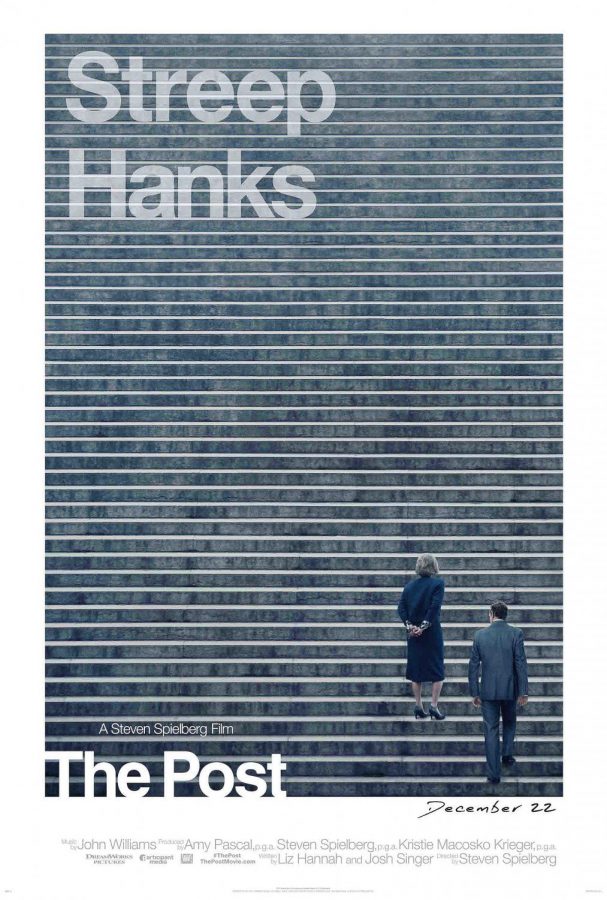Review: The Post
January 28, 2018
Steven Spielberg’s latest film, The Post, has only been in wide release for a week now, but, with its timely themes and two Oscar nominations, the movie has already become a popular topic of discussion. It is a movie about past events, but its message is highly relevant, serving as a reminder that the freedoms of press that we rely upon today were not always guaranteed, and that they still need protecting, perhaps now more than ever.
The Post revolves around the leaking of the Pentagon Papers, a classified study by the Department of Defense which revealed, in thousands of pages of extensive detail, the full extent of the US government’s failure in Vietnam- covering the lies and blunders of presidents from Truman to Nixon.
While The New York Times is rightfully credited with being the first newspaper to break the Pentagon Paper’s story, Spielberg’s movie focuses instead on the role played by The Washington Post and its owner, Katharine Graham, who is played by Meryl Streep.
Graham was in a unique position of power for a woman of her time, one which she had never expected to find herself in. The daughter of The Post’s owner, Eugene Meyer, she had been passed over for leadership of the newspaper for her husband, Phil Graham. Tragically, Phil committed suicide in 1963, and Katharine took over as leader of The Post, becoming the first female publisher of a major newspaper.
With Katharine as its protagonist, The Post adds the theme of a woman finding her power to an already strong message about freedom of the press and journalistic integrity. In almost every scene of the movie, Katharine is the only woman in a room full of men- men who continuously doubt, criticize, and patronize her- attempting to make her voice heard. Streep delivers an amazing performance as a woman who is initially plagued by self-doubt but who grows in confidence and capability as the movie progresses, culminating in her decision to report on the Pentagon Papers, even knowing that she might lose her paper and go to jail as a consequence.
Another key player in The Post is the newspaper’s Managing Editor, Ben Bradlee, played by Tom Hanks, who led The Post’s effort to track down the Pentagon Papers and then encouraged Graham to cover them. Hanks gives a solid performance, with the exception of a weird Boston accent that fluctuates in intensity and isn’t very convincing.
The Post also reminds viewers of just how much journalistic standards have changed, as Graham and Bradlee are forced to question whether their close personal friendships with important political figures such as John F. Kennedy and John McNamara have prevented them from holding those politicians fully accountable.
It is unthinkable today that the owners and editors of prestigious newspapers such as the Washington post would throw house parties with presidents and government officials as guests, but this was an accepted practice in early twentieth century. It was only with the start of 1970s and the eroding trust in the federal government brought on by the Vietnam war that journalists began to distance themselves from the leaders they covered.
However there are times when the dialogue in The Post can become didactic and heavy-handed, when I wanted to like the movie more than I actually did, and wished that it would be more subtle and less preachy. Still, I think that, for the most part, The Post is far less heavy-handed than it could have been, and is equal parts important and entertaining.
As someone who has grown up in a digital age with a very different outlook on journalism, and one of RHSToday’s Editors, I found it fascinating to see how reporting has changed, and can appreciate the timeliness and relevance of the film’s message. Events such as the legal battle surrounding the Pentagon Papers have shaped the news that I and the rest of my generation are able to receive every day, and yet we tend to take them for granted. Movies such as The Post allow us to see past history unfold and be grateful for it, while serving as a powerful reminder that there is always more work to do.










